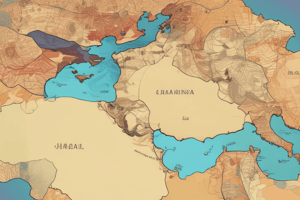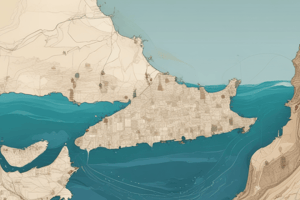Podcast
Questions and Answers
What is a requirement for laws enacted by the Kuwait National Assembly to become valid?
What is a requirement for laws enacted by the Kuwait National Assembly to become valid?
- They must be ratified by the Cabinet of Ministers.
- They must be issued by the Supreme Court.
- They must be approved by a majority vote in the Assembly.
- They must be approved by the Emir within one month. (correct)
How many members of the Kuwait National Assembly are elected by popular vote?
How many members of the Kuwait National Assembly are elected by popular vote?
- 30 members
- 50 members (correct)
- 16 members
- 66 members
What role does the Prime Minister have in relation to Cabinet ministers in Kuwait?
What role does the Prime Minister have in relation to Cabinet ministers in Kuwait?
- The Prime Minister serves as the head of the Supreme Judicial Council.
- The Prime Minister appoints 16 Cabinet ministers. (correct)
- The Prime Minister selects 50 members of the Assembly.
- The Prime Minister appoints all members of the National Assembly.
What type of legal system does Kuwait primarily follow?
What type of legal system does Kuwait primarily follow?
Which court consists of 5 judges and deals with constitutional matters in Kuwait?
Which court consists of 5 judges and deals with constitutional matters in Kuwait?
Which emirate agreed to join the UAE federation in the year following its establishment?
Which emirate agreed to join the UAE federation in the year following its establishment?
What power is NOT granted to Abu Dhabi by the UAE constitution?
What power is NOT granted to Abu Dhabi by the UAE constitution?
Which of the following is a responsibility of the Supreme Council of the Federal?
Which of the following is a responsibility of the Supreme Council of the Federal?
How many votes from the Supreme Council are required for a decision to be approved?
How many votes from the Supreme Council are required for a decision to be approved?
Which of the following rights is guaranteed to UAE citizens by the constitution?
Which of the following rights is guaranteed to UAE citizens by the constitution?
Who assumes responsibilities in the absence of the President of the Federal?
Who assumes responsibilities in the absence of the President of the Federal?
What role does the Supreme Council have in terms of policy within the UAE?
What role does the Supreme Council have in terms of policy within the UAE?
Which emirate is responsible for overseeing immigration in the UAE?
Which emirate is responsible for overseeing immigration in the UAE?
What is the primary role of the Federal National Council (FNC) in the UAE?
What is the primary role of the Federal National Council (FNC) in the UAE?
How many members represent Abu Dhabi and Dubai in the Federal National Council?
How many members represent Abu Dhabi and Dubai in the Federal National Council?
Which of the following statements is true regarding the President of the UAE?
Which of the following statements is true regarding the President of the UAE?
What is a key function of the Federal Supreme Court in the UAE?
What is a key function of the Federal Supreme Court in the UAE?
What was significant about HE Sheikha Lubna Al Qassimi's appointment in 2004?
What was significant about HE Sheikha Lubna Al Qassimi's appointment in 2004?
Which of the following accurately describes the structure of the Federal judiciary in the UAE?
Which of the following accurately describes the structure of the Federal judiciary in the UAE?
How is the Prime Minister of the UAE selected?
How is the Prime Minister of the UAE selected?
In Kuwait's system of government, how is the Emir's authority characterized?
In Kuwait's system of government, how is the Emir's authority characterized?
Flashcards
Kuwait's Prime Minister
Kuwait's Prime Minister
The Prime Minister of Kuwait is responsible for executing executive tasks on behalf of the Emir. They appoint the Cabinet/Council of Ministers, which is then approved by the Emir.
Kuwait's National Assembly
Kuwait's National Assembly
Kuwait's National Assembly is the legislative branch of government. It has 66 seats, with 50 elected by popular vote and 16 appointed by the Prime Minister. The Assembly creates laws and approves or disapproves the Emir's appointments.
How Kuwaiti laws become valid
How Kuwaiti laws become valid
All laws passed by Kuwait's National Assembly need the Emir's signature to be valid. They must be signed by the Emir within one month of being enacted.
Kuwait's Judicial System
Kuwait's Judicial System
Signup and view all the flashcards
How are Kuwaiti Judges appointed?
How are Kuwaiti Judges appointed?
Signup and view all the flashcards
UAE President's Powers
UAE President's Powers
Signup and view all the flashcards
Council of Ministers
Council of Ministers
Signup and view all the flashcards
Federal National Council (FNC)
Federal National Council (FNC)
Signup and view all the flashcards
FNC's Role
FNC's Role
Signup and view all the flashcards
UAE Judicial System
UAE Judicial System
Signup and view all the flashcards
Kuwait's Government System
Kuwait's Government System
Signup and view all the flashcards
Who Appoints the Prime Minister in Kuwait?
Who Appoints the Prime Minister in Kuwait?
Signup and view all the flashcards
UAE Federation
UAE Federation
Signup and view all the flashcards
UAE Constitution
UAE Constitution
Signup and view all the flashcards
Abu Dhabi's Powers
Abu Dhabi's Powers
Signup and view all the flashcards
Supreme Council
Supreme Council
Signup and view all the flashcards
Majority Vote Requirement
Majority Vote Requirement
Signup and view all the flashcards
President and Vice President
President and Vice President
Signup and view all the flashcards
President's Absence
President's Absence
Signup and view all the flashcards
Residual Powers
Residual Powers
Signup and view all the flashcards
Study Notes
Comparative Governments of GCC: UAE & Kuwait
- The UAE was formed in 1971, following the British withdrawal from the Arabian Gulf.
- The UAE federation initially comprised six emirates (Abu Dhabi, Dubai, Sharjah, Umm al-Quwain, Fujairah, and Ajman).
- Later, Ras Al-Khaimah joined, making the UAE seven emirates.
- Qatar and Bahrain formed as separate nations.
- The UAE's political system is based on the constitution, establishing the rules for the federation and local/regional levels.
- The constitution guarantees equal rights and opportunities, safety, security, and social justice to all UAE citizens.
- Abu Dhabi holds significant power, including defense, air traffic control, nationality, passports, residence, immigration, currency, judiciary, foreign affairs and security.
- Remaining emirates have residual powers.
- The Supreme Council is composed of the seven emirs.
- The Supreme Council's powers include enacting legislation, establishing policy, appointing officials, and supervising the federation's affairs.
- Decisions require a majority vote, including the emirs of Abu Dhabi and Dubai.
- The UAE President and Vice President are elected by the Supreme Council for a five-year term.
- They oversee federal legislation and affairs.
- The Vice President handles responsibilities in the President's absence.
- The President holds executive powers, including convening and leading meetings of the Supreme Council.
- The Council of Ministers is headed by the Prime Minister.
- Sheikh Mohammed bin Rashid Al Maktoum currently serves as Prime Minister.
- He selects cabinet ministers from among representatives of the seven emirates.
- Sheikha Lubna Al Qassimi was the first female minister, responsible for the Ministry of Economy and Planning.
- The Federal National Council (FNC) has 40 members representing the seven emirates.
- Seat allocation is proportional to the emirates' populations (Abu Dhabi & Dubai having the most).
- The FNC role is consultative, serving the people and the nation, consolidating shura principles, examining/amending legislation, questioning ministers, and discussing budgets.
- The UAE's judicial system has both federal and local courts.
- The Federal Supreme Court consists of five judges, including a president, appointed by presidential decree and endorsed by the Supreme Council.
Kuwait Background
- Kuwait gained independence from the United Kingdom in 1961.
- Kuwait's constitution, implemented in 1962, combines elements of presidential and parliamentary systems.
- Kuwait is a constitutional emirate with a parliamentary system.
- Governing authorities are divided into legislative, executive, and judiciary branches.
- The Emir heads the authorities.
Kuwait Executive Branch
- The Emir's position is hereditary.
- The Emir appoints the Prime Minister and Deputy Prime Ministers.
- A Cabinet/Council of Ministers is appointed by the Prime Minister, and approved by the Emir.
- The Prime Minister is responsible for executing the Emir's executive tasks.
Kuwait Legislative Branch
- Kuwait’s National Assembly (parliament) has 66 seats.
- 50 seats are elected by popular vote, with 16 cabinet ministers appointed by the Prime Minister.
- Elected members serve four-year terms.
- The National Assembly creates legislature and approves/disapproves Emir's appointments.
- Laws enacted by the National Assembly become official only after the Emir's signature within one month.
Kuwait Judicial Branch
- Kuwait has a civil law system, with Sharia law used for personal matters.
- The judicial system includes the Supreme Court, Appeal Court, and Constitutional Court; each consisting of 5 judges.
- Kuwaiti judges are appointed by the Emir, upon recommendation from the Supreme Judicial Council, a body comprised of Kuwaiti judges and Ministry of Justice officials.
Studying That Suits You
Use AI to generate personalized quizzes and flashcards to suit your learning preferences.
Related Documents
Description
Explore the political systems of the UAE and Kuwait in this engaging quiz. Learn about the formation of the UAE, its constitutional framework, and the distribution of powers among the emirates. Additionally, delve into how these factors shape governance in these two nations.




